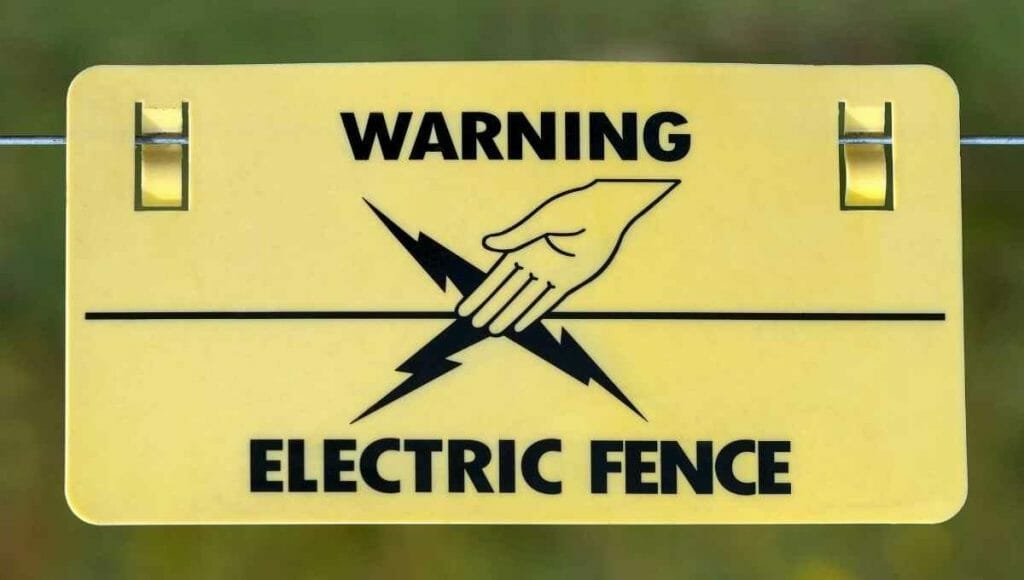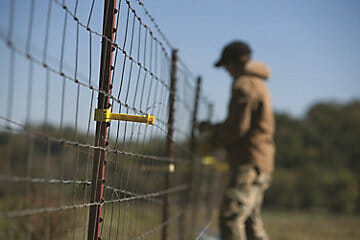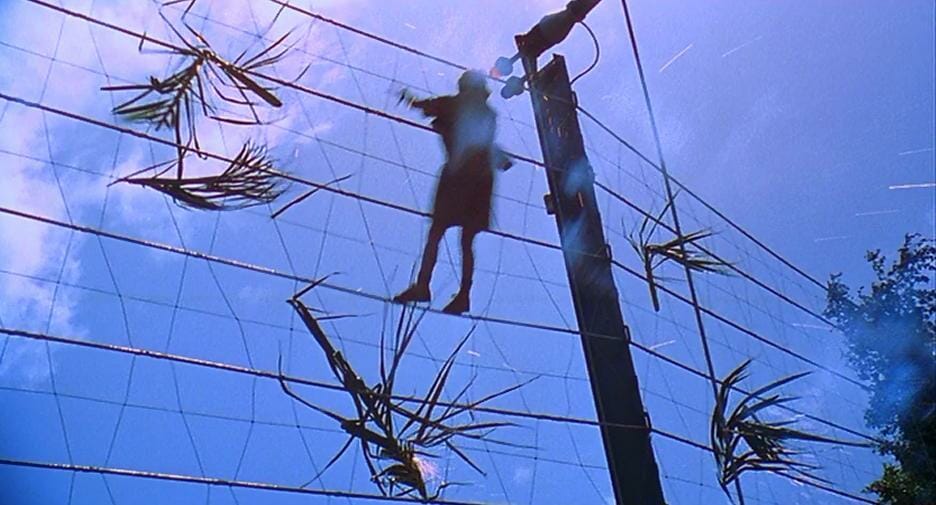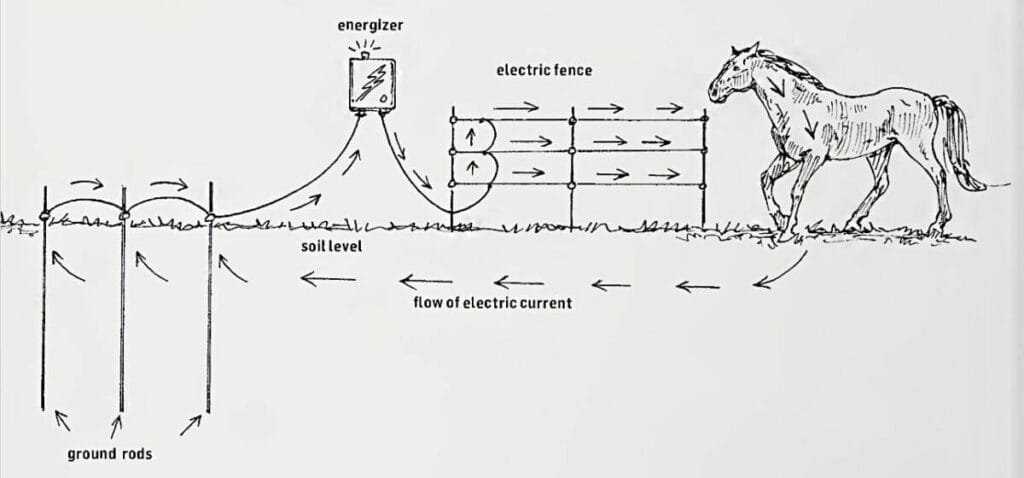Will a 7000 Volt Electric Fence Kill You?

A 7000-volt electric fence is a powerful tool that can keep animals safe from wandering off. But are they safe to touch?
A 7000-volt Electric Fence will not normally kill you, as the lethality also depends on the current flow. Electric fences are not necessarily dangerous because the electricity transmitted through the wires is relatively low. The amps are what could kill, and an electric fence is usually set to a low level of about 120 milliamps. That’s why electric fencing can work with a higher voltage, as it complies with the basic principle of electric fencing: electricity doesn’t shock unless it is moving.
We’ll go into more details below.
Going Near an Electric Fence

If you’ve ever been near an electric fence, you will know how severe an electric shock can be.
Electric fences work the same way as other fences, which is to keep people and animals away from your yard. But unlike them, electric ones use electricity to stop people who shouldn’t be there from getting close.
If you get too close to an energized electric fence, i.e., when it is activated, it will deliver an electric shock through your body and cause uncontrollable muscular spasms. It’s enough to scare away even the most stubborn animals and people who don’t pay attention or misjudge their distance from it.
Touching an electric fence will not likely make you fall off a horse if it wanders into it. Most of the time, the shock from an electric fence is just enough to scare away anyone who touches it, but it’s not meant to hurt. Some animals have thicker skin than others, so they won’t feel much more than an itch when a metal wire touches them.

Lethality of Electric Fences
Can an Electric Fence Kill Someone?
Electric fences are made to hurt, not to kill.
You can’t get electrocuted because the voltage is usually low. You won’t die from touching it. The current flow is too short for it to reach your heart, so it can’t electrocute or kill you. The voltage passing through an electric fence is usually low enough that people and animals only feel slight tingling or sting when touching it. You wouldn’t get fatally shocked by a single wire.
But can you die from an electric fence? Surprisingly, it’s likely not! Electric fences are made to keep animals in, not to keep people from getting hurt (like shock collars for dogs). They are usually not strong enough to kill or seriously harm a person if their hands or feet touch them.
Importantly, the current is too low for it to reach your heart, so it can’t electrocute or kill you.
However, there are a few rare cases where an electric fence system could kill someone. If the voltage is high enough, a person walks into multiple wires at a time, or if their clothes get caught, they could be killed.
So, even though the thought of getting shocked by an electric fence might be scary, it’s important to note that it is not necessarily a fatal incident.
Do Electric Fences Deliver 7000 Volts of Electricity?
No, electric fences don’t deliver 7,000 volts of electricity.
People often think that electric fences give a shock of 7,000 volts, but it’s not true. Wires carry electricity; when they touch an animal, it’s about 10% to 20% of what you’d get from touching an average doorknob after walking on a carpet or touching a standard outlet. It’s enough to scare a cow and make her stop or move away from the fence but insufficient to hurt or damage her.
An electric fence at around 7000 volts would be extremely dangerous for humans. It could cause many problems for people with weak hearts, and it could even cause death. If you will be around a fence like this, it is best to wear rubber-soled shoes and gloves. The rubber soles and gloves will prevent the electricity from transferring to your body, and you’ll be safe.
How Much Electricity Does It Take to Kill Someone?
You might be wondering how much electricity it takes to kill a person.
The answer is probably somewhere between 13,000 and 20,000 volts. Electric fences are made to hurt and scare animals away from your property. They are not meant to kill or electrocute animals.
But if you touch the fence long enough, you could still react badly. If you touch an electric fence with both hands simultaneously, or even just one hand, you can feel your muscles tighten or your nerves tingle. It won’t kill you, though.
Getting Electrocuted

Can You Have a Fatal Reaction to Getting Shocked?
I will tell you what would happen if you get an electric shock.
There is a chance that a bad reaction to being shocked could kill you, especially if you’re sensitive to electricity. How severe the shock is will depend on the voltage and how long you were shocked. Knowing how much electricity is running through an electric fence is necessary to figure out how long it would take for someone to die after getting a shock from touching it.
Even if the voltage is very high, the current may be too low to reach your heart, so you can’t get electrocuted. But we all know that a bad reaction to getting shocked, especially if you are sensitive to electricity, could still kill you.
The Electric Fencing Principle and Current
As you know by now, an electric fence doesn’t necessarily kill because the current is low despite the high voltage.
An electric fence’s current (flow of electricity) is usually set to a low level of about 120 milliamps. It complies with the most important principle of electric fencing: electricity doesn’t shock unless it moves.
Two more factors make an electric fence effective (Hansen, 2017):
- Proper insulation of the charged wires from the ground so that current only flows through the animal or person touching it.
- A good ground system so that the current flowing through it is not diluted during its return to the energizer.

The ground rods act as antennae that receive the current flowing from the fence through the animal into the soil and to the energizer to complete the circuit.
Therefore, The current amount is linked to the antenna’s quality. The weaker and shorter the antenna, the less current will flow, and the lower the maximum shock potential and likely risk of getting electrocuted.
Wire thickness also determines how much or how easily current can flow. Thinner wire restricts current flow, whereas thicker wire allows more electricity to pass easily and lasts longer. Electric fence wires are usually 12.5-gauge steel or 9-gauge aluminum wires.
References
Books:
- “The Electric Fencing Handbook” by Hansen, Ann Larkin. https://www.barnesandnoble.com/w/the-electric-fencing-handbook-ann-larkin-hansen/1123957477
